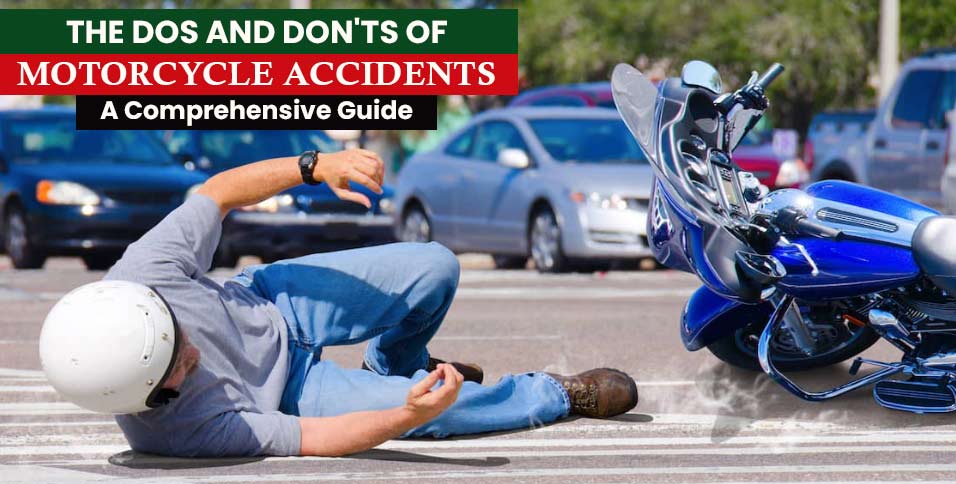Motorcycle accidents are all too common, and it’s essential for riders to be well-informed about the dos and don’ts to protect themselves on the road. Whether you’re a seasoned biker or new to the world of motorcycles, understanding how to navigate these situations is crucial. In this comprehensive guide, we will explore the key dos and don’ts of motorcycle accidents, empowering riders with knowledge that can potentially save lives.
Do: Prioritize Safety Gear
According to the laws for motorcycle insurance in Colorado, wearing proper safety gear is an absolute must for all motorcyclists. Helmets, goggles or face shields, jackets with protective padding or armor, gloves, pants, and boots are not just optional accessories but vital safety equipment. These items significantly reduce the risk of severe injuries in case of an accident.
Don’t: Neglect Regular Maintenance
Regular maintenance is critical to ensuring your motorcycle is in optimal condition and minimizing accidents caused by mechanical failures. Keep tires properly inflated, replace worn brake pads promptly, check lights and signals regularly – neglecting routine maintenance can lead to dangerous situations on the road.
Do: Stay Alert and Focused
Being attentive while riding is one of the most important habits for any motorcyclist. Always keep your eyes on the road ahead and be mindful of potential hazards like potholes, debris, other vehicles changing lanes without signaling, or pedestrians unexpectedly entering traffic.
Don’t: Tailgate
Maintaining a safe following distance between your motorcycle and surrounding vehicles is vital for preventing rear-end collisions. Leave enough space between yourself and the vehicle in front so that you have enough time to react if sudden braking occurs.
Do: Use Defensive Riding Techniques
Defensive riding techniques involve constantly being aware of your surroundings and planning for potential hazards proactively. Stay visible by using reflective materials on your gear and bike, signal your intentions clearly to other drivers, and anticipate threats by adjusting your speed or position accordingly.
Don’t: Forget to Check Blind Spots
Motorcycles can easily slip into blind spots of larger vehicles such as cars and trucks. Avoid potential accidents caused by drivers failing to see you by practicing proper lane positioning, adjusting your mirror angles effectively, and always double-checking blind spots before changing lanes.
Do: Be Prepared for Intoxicated or Distracted Drivers
Unfortunately, intoxicated or distracted drivers are a significant risk for all motorcyclists on the road. Stay vigilant for signs of erratic driving behavior like swerving, sudden braking, excessive speed changes, or weaving in and out of traffic. If you suspect a driver may be impaired or distracted, maintain a safe distance and report them to the authorities if necessary.
Don’t: Ride Without Insurance Coverage
Accidents can happen even to the most experienced riders. Make sure you have adequate insurance coverage that includes liability protection, uninsured/underinsured motorist coverage, medical payment coverage, collision coverage, and comprehensive coverage. Prepare for the unexpected so that any financial burdens are minimized in case of an accident.
Do: Seek Medical Attention Immediately
In the unfortunate event of a motorcycle accident, it’s essential to seek medical attention right away, even if you feel fine or have only minor injuries. Some injuries, such as internal bleeding or concussions, may not present immediate symptoms but can have serious long-term consequences if left untreated. Your health and well-being should always be the top priority.
Don’t: Admit Fault at the Scene
While it is important to cooperate with law enforcement and emergency responders after a motorcycle accident, refrain from admitting fault or making any statements that could be used against you in potential legal proceedings. Stick to factual details of what occurred and let authorities conduct a thorough investigation.
Do: Document the Accident Scene
Gather evidence by taking photos or videos of the accident scene, your injuries, and any damages to your motorcycle. These visuals can be crucial in supporting your insurance claim or legal case later on. Additionally, information must be collected from witnesses who may have observed the accident unfold.
Conclusion
Riding a motorcycle can be an exhilarating experience; however, safety should always be paramount. It’s crucial for every rider to remember the dos and don’ts when it comes to motorcycle accidents in order to protect themselves from harm on the road. By prioritizing safety gear, staying alert and focused on defensive riding techniques while avoiding common pitfalls such as tailgating or neglecting maintenance procedures – riders increase their chances of avoiding accidents altogether or minimizing potential injuries if one does occur.
Also Read: The Freedom of the Open Road: Motorcycle Travel Tips















